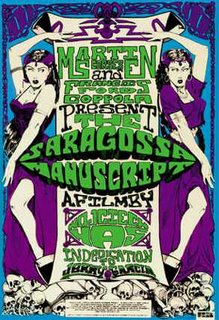The Saragossa Manuscript
 Finally finished watching Wojciech Has' three-hour opus, "Rekopis znaleziony w Saragossie (1965)," or "The Manuscript Found at Saragossa." B&W, in Polish with English subtitles. Yes friends, that's right -- it says "In Dedication to Jerry Garcia." And what a long strange trip it was! Can you imagine Borges on film? Stories within stories within stories, so much that you forget whose story you're witnessing at a given time. But then you realize that it doesn't really matter.
Finally finished watching Wojciech Has' three-hour opus, "Rekopis znaleziony w Saragossie (1965)," or "The Manuscript Found at Saragossa." B&W, in Polish with English subtitles. Yes friends, that's right -- it says "In Dedication to Jerry Garcia." And what a long strange trip it was! Can you imagine Borges on film? Stories within stories within stories, so much that you forget whose story you're witnessing at a given time. But then you realize that it doesn't really matter.The action centers around merchants and noblemen of Inquisition-era Spain and the ghosts and hauntings that plague them. A pair of beautiful harem girls vow their hand(s) in marriage to the lead character, Alfonse Van Worden, played by Zbigniew Cybulski. What a lucky guy! That is, until he finds himself waking up after their supposed first night of conjugal bliss on a barren hillside beneath a gallows with one hand on a pile of skulls and the other hand on a dead man's decaying face! This plot twist recurred many times, reminding me of ancient Buddhist cautionary stories to ward against the temptations of sexual desire.
Van Worden discovers a book which seems to hold the key to the mysterious goings-on. The two women, the gallows, all are portrayed vividly inside. But his attempts to discover what images or hints lie on the following pages all meet with various forms of defeat.
At the end, he meets with a literal reflection of himself cavorting outside with the two women, and remains stuck on the other side, perhaps a prisoner of his own intellectual insistence on the rationality of things, or else of his reluctance to act.
Oh, and if a three-hour B&W film containing philosophical musings on the nature of infinity doesn't float your boat, there is also the brilliant score by Krzysztof Penderecki (composer of "Threnody for the Victims of Hiroshima" as well as the the soundtrack to Kubrick's "The Shining"). And if that doesn't float your boat either, there are also at least a half dozen stunning Polish bombshell actresses to admire.

